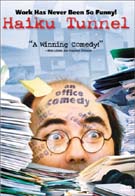 |
|

|
Office comedies have been popular of late. The proliferation of soul-compressing cubicles over the last decade has combined with the fear of the technology that encroaches ever further on the workplace to produce some very rich soil in which comedy may grow. Office Space is the one that springs most easily to mind, but there are others: Clockwatchers, Joe vs. the Volcano, and Haiku Tunnel. Tunnel is the most recent example of the genre, and quite possibly the most realistic. Its hero, Josh Kornbluth, has what his boss likes to call "an artistic temperament." Josh, on the other hand, describes himself as merely "a bad secretary." (Most realistic of all may be the film's consistent use of the word "secretary" instead of more politically correct terms like "personal assistant" or "administrative liaison.") Josh is a bad secretary, in that the quirks of his personality prevent him from mailing out seventeen very important letters for his new boss, Bob. We become intimately familiar with the sight of these letters, mostly in scenes where they sit on Josh's desk. Kornbluth (the character, as opposed to the actor/director of the same name) is a pudgy, neurotic Jew with self-confidence issues, but he is too smart and likable to be a mere stereotype. However, you will instantly recognize his personality: the ambitious and talented artist kept in check by supreme laziness. Not at all the kind of person most of the women in Josh's life would consider "man material," but his charm and wit shine through. Somehow, it's not that unbelievable that, in the film's final act, he manages to (almost unwittingly) masquerade as an attorney when mistaken for one and bed the beautiful Julie Faustino (Sarah Overman, whose film debut is stunningly and confidently natural).
An extremely clean film transfer, with only a few scratches here and there. I was a little surprised at the richness of the surround sound track and the presence of the enhanced anamorphic widescreen support, but they only serve to make the film an even more engrossing experience. The menus are legible and easy to navigate. On my player, the French subtitles seemed to be on by default. Kind of an amusing effect, but hardly desirable.
Low budget films on DVD often have the best extras, usually because the filmmakers are more closely involved with the disk's production. This DVD features deleted scenes, outtakes, trailers for Tunnel, Jackpot, and The Tao of Steve, a quick set of filmographies, and a feature length commentary. The commentary, which is provided by the Kornbluths, is the rambling mess you would expect from a couple of first-time filmmakers. Josh actually says something like "I like that bit where we edited out that guy walking out," without ever filling in the listeners. At times this intimacy between brothers and colleagues is amusing and educational, and at times it is merely tedious. I sat through it in its entirety without falling asleep, probably because the film itself was still entertaining beneath the brothers' banter. Next time, fellas, bring some prepared notes. You're much funnier with a script. Chris Holland, 4/28/2002 |
|
|
|
|
|
|

